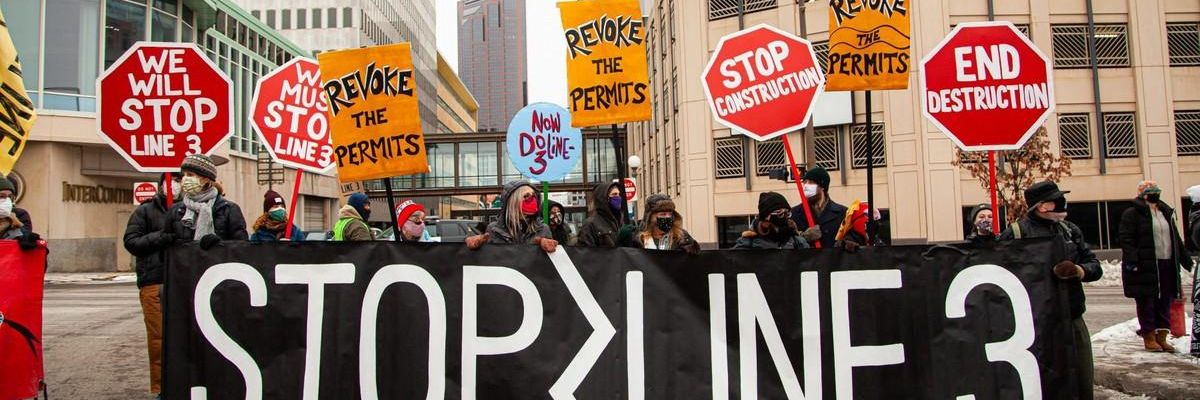On June 23, the Biden Administration's Department of Justice filed a brief that upheld a Trump Administration position on a federal lawsuit challenging a key permit for the Enbridge Line 3 pipeline. The filing stated that the Army Corps of Engineers's decision to issue a permit for Line 3 had "satisfied NEPA's [the National Environmental Policy Act] requirements by taking a hard look at the impacts of issuing the Permit and Permission and considering a reasonable range of alternatives."
"This is a racist pipeline project forced down the throats of our people, an ecological time bomb and a giveaway to a Canadian multinational oil interest."
A lawsuit filed in federal court by the White Earth Band of Ojibwe, the Red Lake Band of Chippewa, Honor the Earth, and the Sierra Club, however, argued that the U.S. Army Corps of Engineers had issued a permit without preparing a proper review, violating NEPA, the Administrative Procedure Act, the Clean Water Act, and the Rivers and Harbors Act.
But this lawsuit is ongoing.
In response, Tara Houska, founder of the Giniw Collective, said: "President Biden's lack of action on Line 3 reads like a decision out of the Dakota Access Pipeline playbook--dismissal of tribal cultural resources and climate through declining to order a full federal Environmental Impact Statement. Allowing Line 3 to tear apart 800 wetlands is a horrific failure to tribal nations, to all future generations who must live with the reality that the generation before acted like they could mitigate [the] climate crisis, that they could compromise water. We cannot mitigate life. Stop Line 3."
Winona LaDuke, executive director of Honor the Earth, said in a statement: "This is a racist pipeline project forced down the throats of our people, an ecological time bomb and a giveaway to a Canadian multinational oil interest."
Michael Brune, executive director of the Sierra Club, added: "Allowing Line 3 to move forward is, at best, inconsistent with the bold promises on climate and environmental justice President Biden campaigned and was elected on. The President must listen to frontline communities, defend the right of all people to clean water and a healthy climate, and act immediately to shut down this dirty tar sands pipeline."
It remains to be seen what the next steps will be with regard to Enbridge Line 3.
On June 14, the Minnesota Court of Appeals decided that the Minnesota Public Utilities Commission had conducted a thorough review of Enbridge Line 3 and the company's Environmental Impact Statement (EIS).
The Minnesota Court of Appeals had previously found the utility commission's revised Final EIS inadequate.
The final Minnesota review, too, had been challenged. Plaintiffs included the Mille Lacs Band of Ojibwe, the Red Lake Nation and the White Earth Nation, Honor the Earth, the Sierra Club, and the Minnesota Department of Commerce.
"The decision today is disappointing, but our fight for our water and what is right continues," said Houska. "Line 3 is a clear violation of Indigenous rights, an abomination to climate science and to human rights. Our resistance is clearly growing, we cannot stop and we will not stop."
On top of all of these decisions, Enbridge Line 3 has amended the amount of groundwater it requested to be allowed to pump during construction from 510 million to nearly 5 billion gallons, which the Minnesota Department of Natural Resources approved on June 4.
It amounts to ten times as much groundwater. Like other parts of the country, the Midwest is currently faced with a severe drought. Moreover, these waters are critical for the wild rice that grows in the region and is crucial to Native communities. Opponents of the pipeline worry that this pumping could affect the quality and quantity of the groundwater. It could also impact the wetlands, streams, and lakes along the pipeline's route.
According to the Minnesota Reformer, "the president of the Minnesota Chippewa Tribe sent a letter to Governor Tim Walz raising concerns that the Department of Natural Resources didn't sufficiently engage with tribes before it approved" this change.
In other Enbridge Line 3 news, the Star Tribune recently reported that an Enbridge 3 contractor has been fined $25,000 for a serious safety lapse that caused a worker's death on the job.
In Michigan, Enbridge Line 5 faces serious delays as the U.S. Army Corps of Engineers announced on June 23 that it will prepare a detailed Environmental Impact Statement--instead of merely conducting an Environmental Assessment--of the underground tunnel proposed for the Straits of Mackinac.
The struggle against Enbridge Line 3 is not over by any means. Opponents of the pipeline plan to continue the fight against it.
On the heels of a month's long investigation by The New York Times that presents the disproportionate impact of climate change on Indigenous people and lands, the Indigenous Environmental Network has called on Indigenous people and climate activists to converge on the White House on June 30, 2021, calling for President Biden to stop fossil fuel projects and to prioritize environmental and climate justice on a range of projects from the Arctic, to the Mountain Valley Pipeline (MVP) in Appalachia to Enbridge Line 3 in Minnesota.

